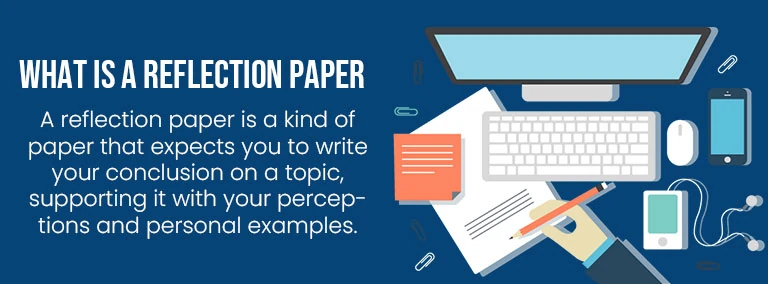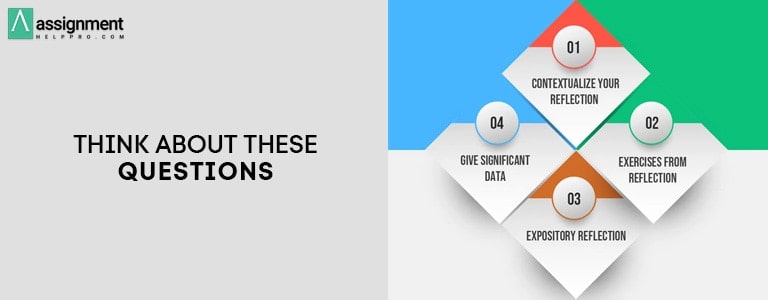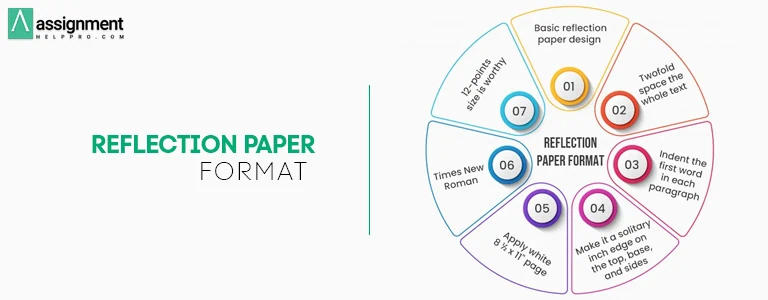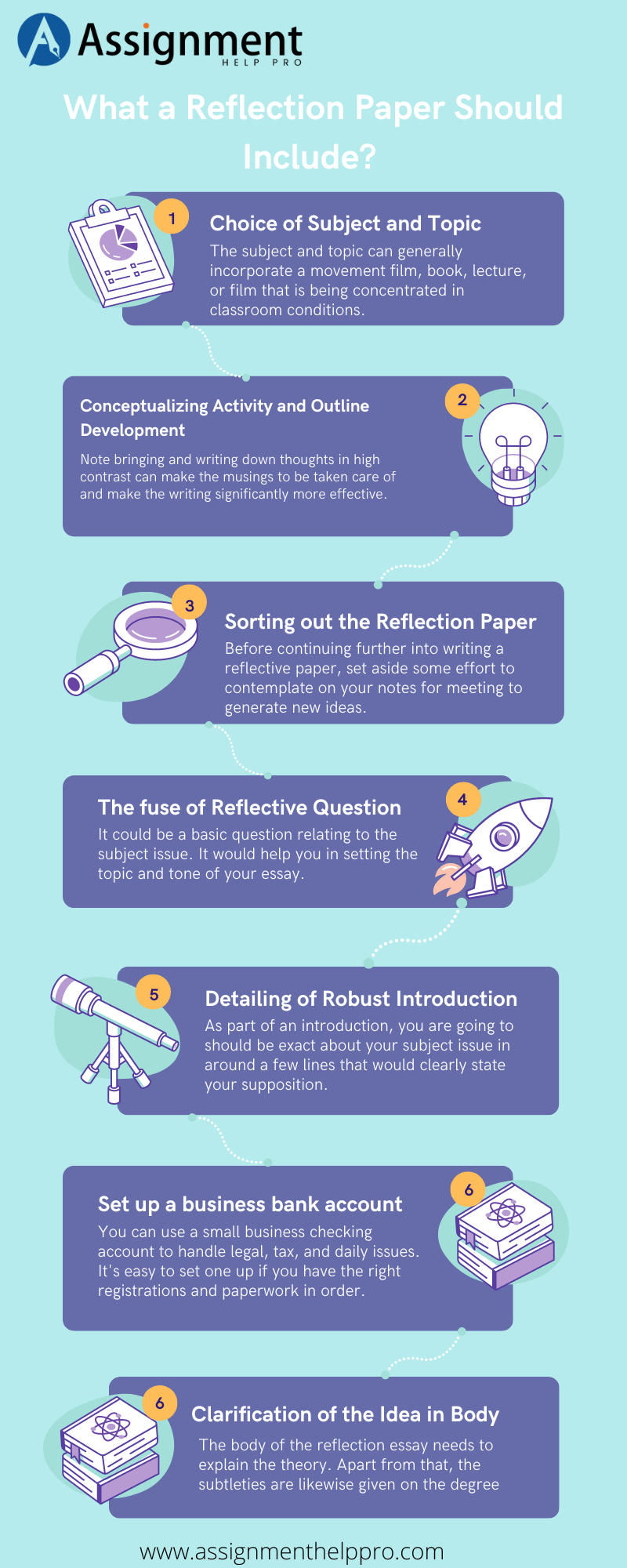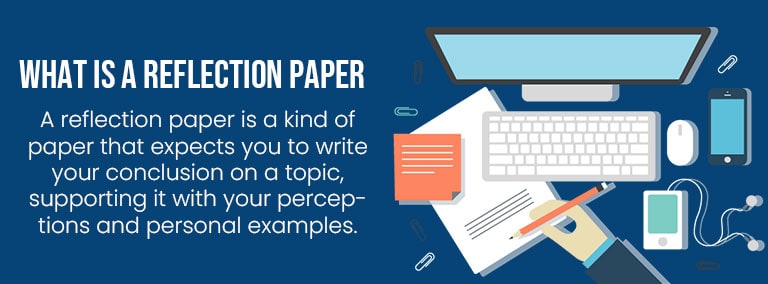A reflection paper is a type of writing where you should think deeply about your experiences. Generally, a reflection paper analyzes what happened, how you felt, and what you learned. This will help you grow and understand yourself better. Furthermore, by writing a reflection paper, you can explore your thoughts and gain new insights.
Would you have to submit a reflection paper, but have no idea what it means? If yes, then this blog post is for you. Basically, a reflection paper is a type of academic paper that is common among undergraduate students. It is usually written in an academic tone and is always framed in a personal and subjective manner. Continue reading this blog to know more about the definition of a reflection paper and the effective ways to write it.
What is a Reflection Paper?
A reflection paper is a kind of paper that expects you to write your conclusion on a topic, supporting it with your perceptions and personal examples. Hence, rather than introducing your reader the assessments of different academics and writers. In this essay, you get a chance to write your point of view—and best of all, there is no wrong answer.
Thus, it is your sentiment, and you must communicate your musings in a way that will be conceivable and clear to any readers who will read your paper. Also, the topic runs are perpetual. Here, we have mentioned a few examples.
Regardless of whether you think outsiders exist, what your preferred TV show is, or what your conclusion is on the result of WWII. You can write about basically anything.
Different Types of Reflection Paper
In general, a reflection paper is categorized into three types: an instructive reflective paper, an expert paper, and a personal reflective paper.
In the instructive reflective paper, your job should be to write a critique about a book, movie, or class you joined. On the other hand, an expert paper is written by individuals who study or work in education or brain research. For instance, it can be a reflection of somebody’s conduct. The personal reflective paper investigates contemplations and feelings about a personal subject.
Significance of Writing a Reflection Paper
So, reflection offers you the chance to consider how your encounters and perceptions shape your reasoning and your acknowledgment of groundbreaking thoughts. Moreover, educators regularly request that students write reading reflections.
Furthermore, they do this to urge you to investigate your thoughts regarding a text and to communicate your feelings instead of summing up the assessments of others. Hence, reflective writing can help you to improve your scientific abilities. Because it expects you to communicate what you think, and all the more significantly, how and why you imagine that way.
What’s more, reflective analysis requests that you recognize that your musings are molded by your suspicions and assumptions. Hence, in doing so, you can value the thoughts of others. Well, notice how their suppositions and assumptions may have formed their considerations, and maybe perceive how your thoughts uphold or restrict what you read.
How to Deal With Reflection Paper Queries?
You may consider how your educators evaluate your reflective writing. What are they searching for? By what means can my encounters or thoughts be correct or wrong?
Your teachers anticipate that you should critically draw on ideas from your course by mentioning associations between your objective facts, experiences, and sentiments. They anticipate that you should explain and break down these ideas from your point of view, inspiring unique thoughts and empowering dynamic enthusiasm for the course material.
It tends to be difficult to realize where to start when writing a critical reflection. First, realize that – like some other academic bit of writing – a reflection requires tight concentration and solid analysis.
The best methodology for identifying a concentration and for reflective analysis is cross-examination. The accompanying offers recommendations for your line of request when building a reflective reaction.
Experiential Reflection
It is ideal to talk about your encounters in a work placement or practicum within the context of personal or hierarchical objectives; doing so gives significant insights and points of view to your development in the field. For reflective writing, it is imperative to adjust announcing or descriptive writing with critical reflection and analysis.
Think About These Questions
Contextualize Your Reflection
What are your real objectives? What are the goals of the association? How do these objectives fit with the subjects or ideas from the course?
Give Significant Data
What is the name of the host association? What is their main goal? Who do they serve? What was your job? What did you do?
Expository Reflection
What did you gain from this experience? About yourself? About working in the field and society.
Exercises from Reflection
Did your experience fit with the objectives or ideas of the course or association? Why or why not? What are your exercises for what’s to come? What was fruitful? Why? What might you do any other way? Why? In what manner will you plan for future involvement with the field?
Think About the Motivation Behind the Reflection
To exhibit your learning in the course. It is critical to effectively and straightforwardly associate ideas from class with your personal or experiential reflection. The accompanying example shows how a student’s perceptions of a classroom can be broken down by utilizing a hypothetical idea and how the experience can help a student assess this idea.
For Example
My perceptions from the classroom exhibit that the progressive structure of Bloom’s Taxonomy is hazardous, an idea likewise investigated by Paul (1993). The students regularly joined exercises like application and blend or analysis and assessment to assemble their insight and perception of new ideas.
Reading Reflection
Critical reflection requires mindful and steady demands. Although fundamental questions like “What is the proposal?” and “What is the evidence?” are imperative to show your understanding, you have to examine your presumptions and information to extend your analysis and center your appraisal of the text.
Evaluate the text(s)
What is the primary concern? How is it created? Identify the reason, sway, as well as the hypothetical structure of the text.
What thoughts stood apart from me? Why? Is it accurate to say that they were new or contrary to the existing grant?
Build Up Your Thoughts
What do I think about this topic? Where does my current information originate from? What are the perceptions or encounters that shape my comprehension?
Do I Concur or Differ with this Contention? Why?
Make Links:
- How does this text strengthen my current thoughts or suspicions?
- And, how does this text challenge my current thoughts or presumptions?
- How does this text help me to more readily comprehend this topic or investigate this field of study/discipline?
Standard Format of a Reflection Paper
Reflection papers don’t regularly follow a specific arrangement. Since it is your conclusion, teachers ordinarily let you handle them any way you are alright with. It is ideal to write your considerations freely, without any specific rules. If your reflection paper was assigned to you, the arrangement of your paper may rely on the models set by your educator. School reflection papers (otherwise called reflection essays) can normally run between 400-800 words long.
Here’s how we recommend you design your reflection paper:
- Basic reflection paper design
- Twofold space the whole text
- Indent the first word in each paragraph
- Apply white 8 ½ x 11″ page
- Times New Roman
- A 12-point size is worthy
- Make it a solitary inch edge on the top, base, and sides
Know How to Write a Powerful Reflection Paper
The first activity when starting to deal with a reflection essay is to read your article altogether while taking notes. Regardless of whether you are considering, for example, an action, a book/newspaper, or an academic essay, you need to feature key thoughts and ideas.
You can start writing your reflection paper by summing up the primary idea of your notes to check whether your paper incorporates all the data required for your readers. It is helpful to include charts, graphs, and inclines to convey your plans to the crowd in a superior manner.
After you have wrapped up your article, it’s time to conceptualize. We have a straightforward conceptualizing method for writing reflection papers.
Simply answer a portion of the fundamental questions below:
- How did the article influence you?
- How does this article get the reader’s consideration (or does everything)?
- Has the article adjusted your perspective on something? If in this way, explain how.
- Has the article left you with any questions?
- Were there any unaddressed critical issues that didn’t show up in the article?
- Does the article identify with anything from your past reading encounters?
- Does the article concur with any of your past reading encounters?
Another great method to arrange your thoughts is to write them down in a 3-column chart or table.
Here are some reflection paper topic examples for you to remember before planning to write your own:
- How my perspectives on rap music have changed over time
- My reflection and understanding of Moby Dick by Herman Melville
- Why has my hypothesis about the size of the universe changed over time
- How my perceptions of clinical psychological studies have been created in the most recent year
The final product of your conception ought to be a written diagram of the contents of your future paper. Try not to skirt this progression, as it will guarantee that your essay will have a legitimate stream and suitable association.
Reflection Paper Outline Writing Steps
Introduction
Your introduction ought to specify what you’re reflecting upon. Ensure that your proposition educates your reader about your overall position or assessment of your subject.
- State what you are investigating: a section, a lecture, an academic article, an encounter, etc.
- Quickly sum up the work.
- Write a postulation statement stating how your subject has influenced you.
One way you can start your postulation is to write:
Example:
“In the wake of reading/encountering (your picked topic), I picked up the information on… “
Body Paragraphs
The body paragraphs ought to examine the thoughts and experiences you’ve had in context to your topic. Ensure each new body paragraph starts with a topic sentence.
If you are writing about a book or an academic article, your reflection may incorporate statements and entries. They give your reader a point of reference to completely comprehend your criticism. Feel free to depict what you saw, what you heard, and how you felt.
Example:
“I saw numerous individuals participating in our weight test. The environment felt anxious yet motivating. I was stunned by the fervor of the occasion.”
Essential Components to Include in a Reflection Paper
A reflection paper needs to incorporate various potential advances that including:
Subject and Title
The subject and topic can generally incorporate a movement film, book, lecture, or film that is being concentrated in classroom conditions. Apart from that, the students are likewise entrusted with writing about their encounters bearing the subject issue. The chosen subject can be considered as the structural square of your reflection essay
Conceptualizing Activity and Outline Development
Note-taking and writing down thoughts in high contrast can make those musings to be take care of and make the writing significantly more effective. You can start by writing down a couple of sentences that identify with your central topic.
They can serve as note-taking points for building up the staying power of your notes. Nonetheless, it is important to remember to advance your feelings as part of conceptualizing. By meeting to generate new ideas, you can make an unpleasant diagram for your paper.
Sorting out the Reflection Paper
Before continuing further into writing a reflective paper, set aside some time to contemplate your notes from the meeting to generate new ideas. The following are a few stages that are fundamental for arranging the reflection paper:
Engaging Reflective Question
It could be a basic question relating to the subject issue. It would help you in setting the topic and tone of your essay. The first-person pronoun is usually utilized as a part of the structure of the reflection paper.
Robust Introduction
As part of an introduction, you are going to should be exact about your subject issue in around a few lines that would clearly state your supposition.
Powerful Thesis Sentence
After a powerful introduction, you have to develop a proposition sentence in the early paragraph that articulates your assessment, desires, and musings about the subject issue. The proposition gives unity and center to your reflective paper as a whole.
Detailed Body Paragraphs
The body of the reflection essay needs to explain the theory. Apart from that, the subtleties are likewise given on the degree to which it has or has not lived up to your desires upheld by evidence.
Finishing Up Remarks
Based on your thoughts and desires, you should quickly articulate the closing comments, dependent on your feelings and considerations, in a few sentences.
Tips for Writing an Excellent Reflection Paper
- The writer should apply a descriptive approach to the writing. Simply depict your thoughts. Write down your considerations. Your readers ought to comprehend the principal stream.
- Recall that your essay has a narrative style. It is an academic paper. In this way, you should keep it as formal as it is conceivable.
- The structure of your essay ought to be truly classical. Think about writing an introduction, principal body paragraphs, and a conclusion. This is the ideal approach to start if you have to figure out how to write a reflection paper.
- The writer ought not to overlook that it is needed to utilize not just your personal experience. Get a few realities and other general materials.
- The writer ought not to be so personal. Truly, the reality of the reflective essay is your personal experience. It isn’t a companion letter; it is an academic paper.
- It is about personal experience. But the experience ought to be specific and fit the topic. The writer ought to make an effort not to drive your whole experience into one essay. Simply get the privilege and, most importantly, accommodate your topic.
- The writer ought to make an effort not to write the entire essay without a moment’s delay. To complete everything right, you have your brain map. Simply follow it and your fundamental direction.
- Your essay ought not to be a free-streaming analysis. All the ideas ought to be organized and clear. Something very similar is about the creator’s thoughts and realities. The request ought to be logical.
Read more: Unique Research Paper Topics For Excellency
Conclusion
We hope you are now clear about what a reflection paper means and the steps for writing it. In case you have any doubts regarding reflection paper writing or if you need expert essay help with writing a reflection paper, then feel free to contact us.
1. How do you write a reflection paper?
To start a reflection paper, you need to begin with the topic itself. You have to introduce the topic and discuss what the paper or reflection is all about.
2. What are the 3 basic parts of the reflection paper?
A reflection paper comes with a very easy and simple structure. It has 3 parts: introduction, main body, and conclusion.
3. What is a reflection paper sample?
Any movie or book review by a person is a sample of a reflection paper. Anything where you have to give your opinion is an example of a reflection paper or reflective paper.
4. How do you write a good reflection?
To write a good reflection, you have to introduce what your reflection is all about in the introduction. In the body paragraph, you need to state your reflection in different paragraphs with different headings. In the end, you have to conclude with clear opinions about your likes and dislikes about it.
